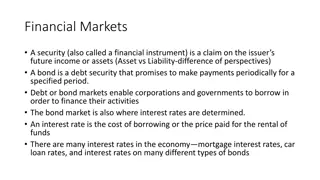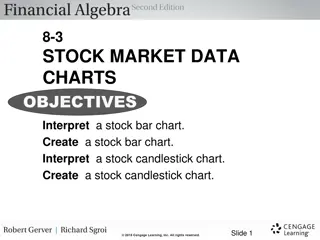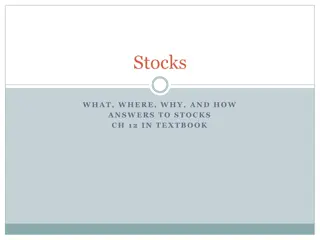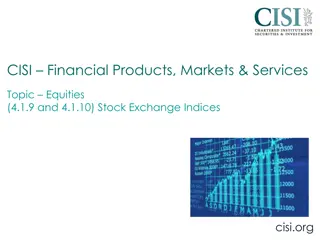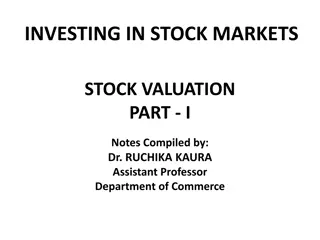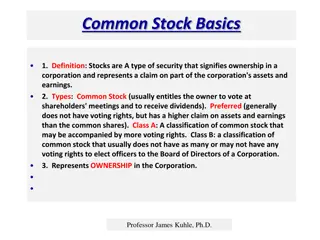The Secondary Market and Stock Exchange
The secondary market plays a vital role in the financial world by facilitating the buying and selling of existing industrial securities. Stock exchanges ensure liquidity and provide a platform for trading various securities, including government and company securities. Learn about the functions and characteristics of stock exchanges, their role in mobilizing savings, and how they act as economic indicators. Dive into the world of securities trading and understand the essential functions of the stock exchange in shaping the economy.
Download Presentation

Please find below an Image/Link to download the presentation.
The content on the website is provided AS IS for your information and personal use only. It may not be sold, licensed, or shared on other websites without obtaining consent from the author.If you encounter any issues during the download, it is possible that the publisher has removed the file from their server.
You are allowed to download the files provided on this website for personal or commercial use, subject to the condition that they are used lawfully. All files are the property of their respective owners.
The content on the website is provided AS IS for your information and personal use only. It may not be sold, licensed, or shared on other websites without obtaining consent from the author.
E N D
Presentation Transcript
Secondary Market Secondary Market - The financial market concerned with the purchase and sale of already existing industrial securities is called as secondary market. In this market, industrial securities which are already held by the individuals and institutions are bought and sold. Stock exchanges are the important ingredients of the secondary market and generally all the securities are quoted in the stock exchanges. Stock exchanges recognized by the Government of India facilitate the buying and selling activities. Securities Contracts (Regulation) Act, 1956 regulates all the stock exchanges and Bombay Stock Exchange & National Stock Exchange are the main stock exchanges in India.
Functions of secondary market The secondary market provides liquidity to the securities. Continuous and regular market in the form of stock exchange is present in this market for trading the securities. Government, Semi-Government and Company securities are traded in the stock exchange. The component of secondary market that deals with Government securities is called as Guilt-edged market as the government securities never lose their basic value. The stock exchanges in India are established under the provisions of the Securities Contracts (Regulation) Act, 1956 and are regulated and controlled by the Securities and Exchange Board of India (SEBI)
Stock Exchange Stock exchange is a place where securities like shares, debentures bonds, etc., are bought and sold on a continuous and regular basis. It is organized as an association, a society or a company with a limited number of members. The persons who act as brokers for purchase and sale of securities are called as stock brokers and only such stock brokers can become the members of a stock exchange. Under the Securities Contracts (Regulation) Act, 1956 a stock exchange is defined as an association , organization or body of individuals, whether incorporated or not, established for the purpose of assisting, regulating and controlling business of buying, selling and dealing in securities .
Characteristics of a stock exchange The main characteristics of stock exchange are: 1. It is an organized market where securities are bought and sold 2. It allows trading of only listed securities 3. The various transactions of the stock exchange are regulated by the rules and laws of the respective stock exchange. 4. It provides complete information about the prices, volume of trade, etc., on a daily basis. 5. It acts as an indicator of the economic activity of the country.
Functions of the stock exchange The main functions of a stock exchange are: 1. Providing liquidity and marketability for securities through a ready and continuous market 2. Providing of information about prices, purchases, sales, etc. 3. Providing safety to the funds and dealings in securities 4. Providing means for mobilization of savings and supply of long term funds through capital formation 5. Enabling movement of funds from unprofitable ventures to profitable ventures 6. Motivating the companies to improve their performance 7. Acting as a barometer that reflects the economic and business conditions of the country 8. Allocating the available funds in a better and useful way 9. Providing platform for marketing of new issues through listing in the stock exchange.
Advantages of stock exchange The main benefits of stock exchange are: A. To the company 1. Better goodwill and credit rating. 2. Global market for their securities 3. Better bargaining power in the areas of collective ventures, mergers, etc., as a result of better goodwill, credit rating and market across the world. 4. Convenience to decide upon the size, price and timing of the issue.
B. To the investors 1. Ready market for their securities 2. Freedom from anxiety about the delivery and payment problems. 3. Rational decisions as accurate and timely information is available 4. Convenience of raising loans from banks on the basis of listed securities
C. To the society 1. Increase in the savings and investment 2. Increase in the capital formation 3. Promotion and expansion of industrial activities 4. Indicate the changing economic health of the country 5. Help government to raise required funds for development activities





